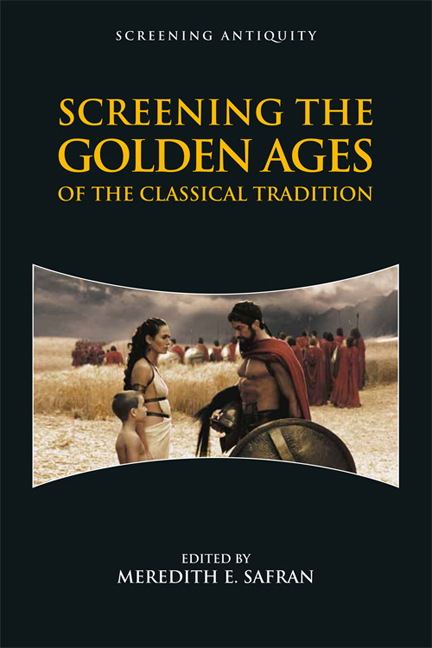Book contents
- Frontmatter
- Contents
- Series Editors’ Preface
- Editor's Acknowledgments
- Contributors
- Illustrations
- Abbreviations
- Introduction: Searching for Gold in an Age of Iron
- PART I THE GLORY THAT WAS GREECE
- PART II THE GRANDEUR THAT WAS ROME
- 8 “All That Glitters …”: Problematizing Golden-Age Narratives in Vergil's Aeneid and the Western Film Genre
- 9 The Golden Age and Imperial Dominance in the Aeneid and Serenity (2005)
- 10 Turning Gold into Lead: Sexual Pathology and the De-mythologizing of Augustus in HBO's Rome (2005–2007)
- 11 The Dux Femina Ends Westeros’ Golden Age: Cersei Lannister as Agrippina the Younger in HBO's Game of Thrones (2011–)
- 12 The Golden Aspects of Roman Imperialism in Film, 1914–2015
- 13 Broken Eagles: The Iron Age of Imperial Roman Warfare in Post-9/11 Film
- 14 Dreaming of Rome with Ridley Scott's Gladiator (2000)
- Filmography
- Bibliography
- Index
8 - “All That Glitters …”: Problematizing Golden-Age Narratives in Vergil's Aeneid and the Western Film Genre
from PART II - THE GRANDEUR THAT WAS ROME
Published online by Cambridge University Press: 23 November 2019
- Frontmatter
- Contents
- Series Editors’ Preface
- Editor's Acknowledgments
- Contributors
- Illustrations
- Abbreviations
- Introduction: Searching for Gold in an Age of Iron
- PART I THE GLORY THAT WAS GREECE
- PART II THE GRANDEUR THAT WAS ROME
- 8 “All That Glitters …”: Problematizing Golden-Age Narratives in Vergil's Aeneid and the Western Film Genre
- 9 The Golden Age and Imperial Dominance in the Aeneid and Serenity (2005)
- 10 Turning Gold into Lead: Sexual Pathology and the De-mythologizing of Augustus in HBO's Rome (2005–2007)
- 11 The Dux Femina Ends Westeros’ Golden Age: Cersei Lannister as Agrippina the Younger in HBO's Game of Thrones (2011–)
- 12 The Golden Aspects of Roman Imperialism in Film, 1914–2015
- 13 Broken Eagles: The Iron Age of Imperial Roman Warfare in Post-9/11 Film
- 14 Dreaming of Rome with Ridley Scott's Gladiator (2000)
- Filmography
- Bibliography
- Index
Summary
In recent years, classical receptions scholars have become familiar with the argument that the Western film genre in America fulfills a role that is culturally equivalent to that of the Homeric epics in ancient Greece. Both focus on the “self-questioning warriors” of old, larger-than-life men whose work laid the foundation for the audience's contemporary society, and who provide formative models of idealized manhood in stories that shape and reinforce cultural ideologies more broadly. The Western genre's relationship to Vergil's Aeneid, however, has received far less attention, despite demonstrating many of the same parallels with Western cinema that have been elucidated for Homer's works. Yet the production and reception contexts of many Westerns, particularly those of the genre's “golden age” in the mid-twentieth century, are much closer kin to those of the Aeneid than they are to the Iliad and Odyssey. Furthermore, unlike Homer's works, Vergil's epic and many of these Westerns trouble the simplicity of the ideologically charged foundation myths they employ by calling attention to the violence and inequities on which the “golden” eras that they enabled were built. Both the Aeneid and many golden-age Westerns thus embed a subtle critique of foundational mythologies – and of the societies built upon them – into narratives that initially appear to be vehicles for promoting and reinforcing their worth.
GOLDEN AGES IN ANCIENT ROME AND MODERN AMERICA
The concept of a “golden age,” now commonly used to denote the high point in the history of a nation or artistic genre, reaches back to classical antiquity, where it played a far more complex role. At Rome in particular, the cyclical return of the aureum saeculum (the phrase commonly translated as “golden age”) was expected to bring peace and prosperity to society as a whole – a condition that Rome's first emperor, Augustus, and his supporters were eager to evoke after the violent civil wars that preceded his reign. In service to this agenda, Augustus commissioned Vergil to create an epic for Rome that would serve as a locus for national identity much like Homer's epics did for the Greeks. Augustus expected that Vergil would produce a propagandistic work that would legitimize and promote his regime while helping to smooth over its problematic anti-republican nature and minimize Augustus’ role in the devastating civil wars that established his supremacy.
- Type
- Chapter
- Information
- Screening the Golden Ages of the Classical Tradition , pp. 157 - 174Publisher: Edinburgh University PressPrint publication year: 2018



